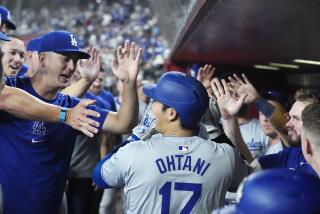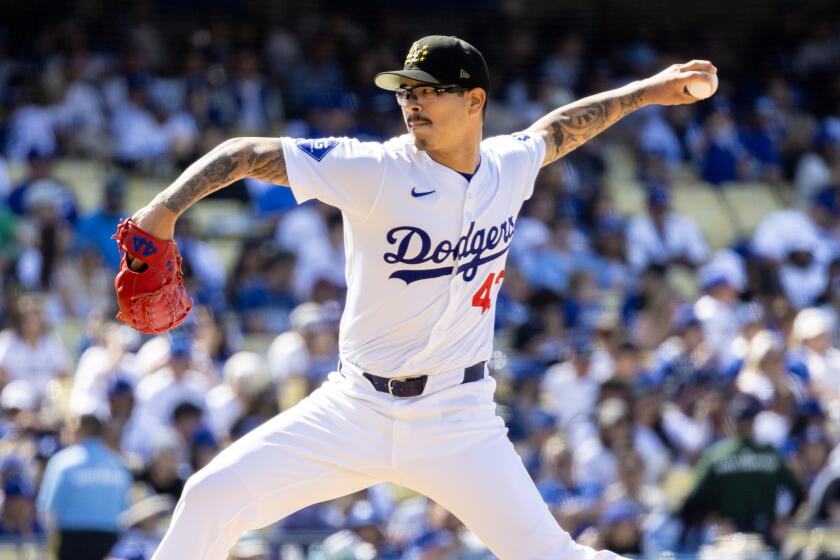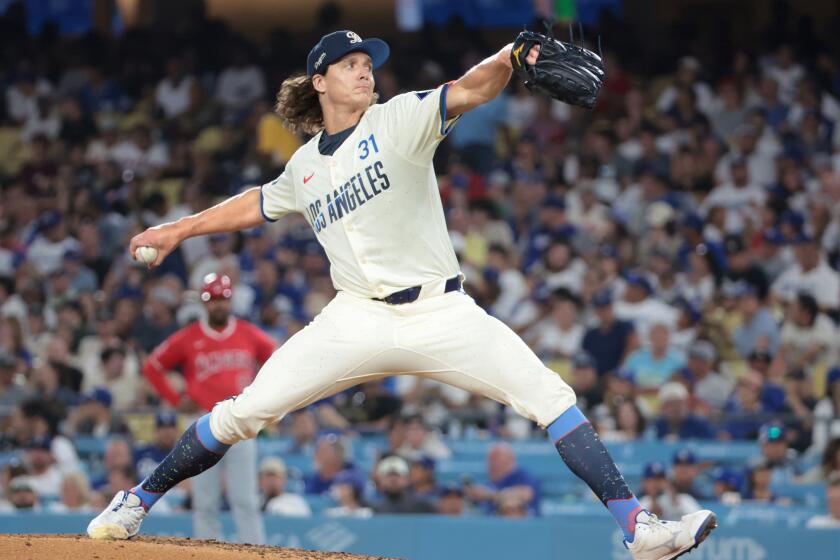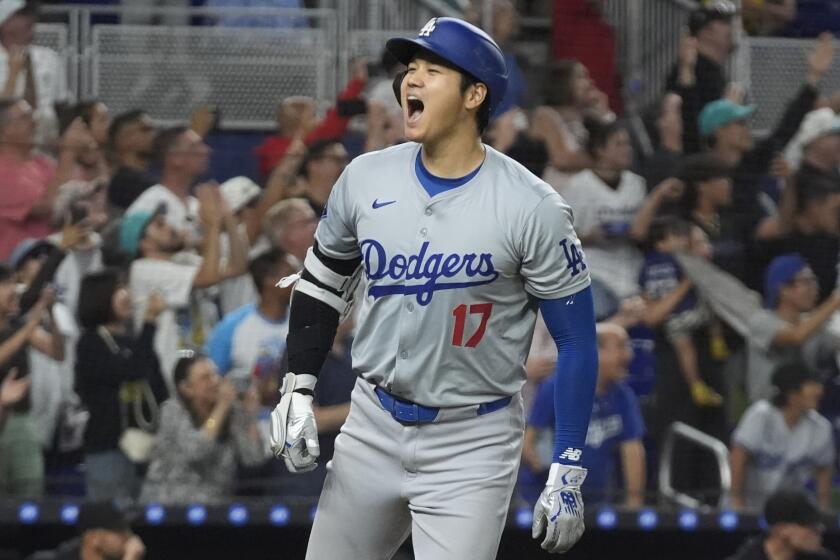Clayton Kershaw and Dodgers win duel with Stephen Strasburg and Nationals
As the bottom of Wednesday’s seventh inning unfolded, Clayton Kershaw operated as if the eighth inning belonged to him. There was no reason to believe otherwise. He had limited Washington to one run on 95 pitches. Due to bat third, he ditched his glove, grabbed his bat and strode into the on-deck circle.
While Kershaw waited to hit, manager Dave Roberts pondered the wisdom of allowing the left-hander to continue. He had intended to keep the game in Kershaw’s hands, but he started to reconsider. Kershaw would admit later that “I didn’t have much today in the tank,” and Roberts noticed. He recalled the loud outs made by the Nationals, one of the game’s most ferocious lineups, and the imprecise command displayed by the Dodgers ace.
“I basically changed my mind,” Roberts said after the Dodgers’ 2-1 victory over Washington.
The decision to remove Kershaw created turmoil in a game that did not lack drama already. Taken out after he struck out to end the seventh inning, Kershaw (8-2) fumed in the dugout as Pedro Baez surrendered a leadoff triple to shortstop Trea Turner to start the eighth. With the lead in danger, Baez recovered to strike out one batter and snag a hard grounder to start a rundown that erased Turner. Roberts turned to Kenley Jansen for the final four outs.
The victory allowed the Dodgers (36-25) to avoid a sweep. It also underscored one of Roberts’ axioms about his job. His toughest days to manage, he likes to say, occur when Kershaw starts. Roberts must weigh the present versus the future. He tries not to drain a pitcher who will never ask to be removed from the mound.
In an effort to avoid overworking Kershaw, the team has held him to fewer than 100 pitches in six of his 13 starts this season. Kershaw has said he understands the strategy, so long as the game dictates his presence is no longer necessary. On Wednesday, clinging to a one-run advantage against the leaders of the National League East, did qualify. Kershaw chose his words with care.
“I’m going to say something cliche, but it is what it is,” Kershaw said. “So, there you go.”
Roberts understood the pitcher’s position. As the manager, he must thread the needle between the desires of the players, the advice of the front office and his contemporaneous intuition. Deciding how to utilize Kershaw, the game’s finest pitcher and the organization’s most precious asset, often causes those forces to collide.
“He never wants to come out of the game, and I respect that,” Roberts said. “But it’s my decision to do what I think is best for the club.”
The game began as a pitcher’s duel between Kershaw and Stephen Strasburg. Trampled by Max Scherzer on Tuesday, the Dodgers faced a worthy sidekick Wednesday. Strasburg entered the game with a 2.91 earned-run average, and blanked his hosts for five innings.
Kershaw blinked first. He paid for a fastball at the knees of first baseman Ryan Zimmerman to start the second inning. Zimmerman hammered the pitch over the left-field fence for his 17th homer.
“The ball seemed like it was off the plate, in, but I throw a lot of heaters, in, first pitch,” Kershaw said. “I bet he was expecting it. It was an impressive swing, for sure.”
Strasburg held the lead with care. Adrian Gonzalez hit a two-out single in the first. Chase Utley reached third base on an error in the second. Neither man could advance an inch. Strasburg struck out the side in the fourth.
The Dodgers broke Strasburg’s spell in the sixth. Kershaw aided the cause by making Strasburg throw nine pitches to start the inning. Kershaw fouled off four in a row before grounding out. The crowd applauded his effort, and Roberts saluted him from the dugout. The at-bat, the manager said later, swung the momentum toward the Dodgers.
After an eight-pitch at-bat by Chris Taylor, Corey Seager came to the plate. Seager had struck out in his first two at-bats, unable to catch up with Strasburg’s fastball. His timing was better in their third encounter. After a trio of changeups, Seager tied the score by homering on a heater.
“It’s hard to throw when you have those long innings like that,” Seager said. “He made some mistakes, and we capitalized on it.”
Strasburg struck out Gonzalez, which should have ended the inning. Except the 3-and-2 curveball bounced by catcher Jose Lobaton for a passed ball. Gonzalez took second on a wild pitch. Yasmani Grandal provided the go-ahead double.
Through seven innings, Kershaw struck out nine and gave up three hits. Yet, the Nationals lined out four times in the sixth and seventh innings. The outs piled up, but so did Roberts’ concern about how to finish the game. He informed Kershaw about Baez’s arrival after Kershaw finished his at-bat in the seventh. Kershaw sat on the bench as Turner tripled against Baez.
Before he converted to pitching, Baez was a third baseman. His reflexes benefited him when Harper smashed a grounder up the middle. Baez corralled the baseball and hung up Turner in a rundown. The play allowed the Dodgers to escape, and reduced the agita surrounding Kershaw’s departure.
“Honestly, it comes with the job,” Roberts said. “I can only do what I think is the right thing for our club and live with whatever happens.”
Twitter: @McCulloughTimes
ALSO
Alex Wood to rejoin Dodgers’ rotation this weekend against Cincinnati
Dodgers minor league team cancels promotion that called women ‘hourglass-shaped color commentators’
Column: Dodgers have no chance without Clayton Kershaw, yet they risk antagonizing him
More to Read
Are you a true-blue fan?
Get our Dodgers Dugout newsletter for insights, news and much more.
You may occasionally receive promotional content from the Los Angeles Times.











